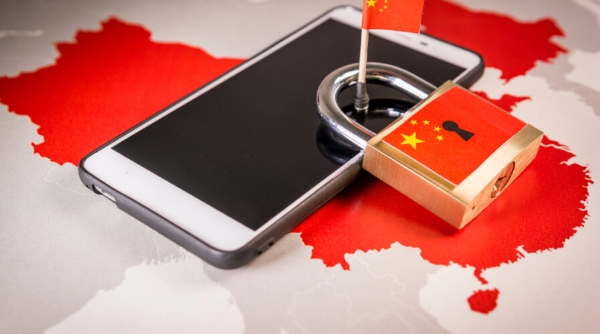Internet Censorship Regime in China
A Hong Kong-based newspaper South China Morning Post reported that these regulations have been mandated amid rising discontent among Chinese people regarding the prolonged continuation of the Zero-COVID policy.
Total Views |
The government of the People’s Republic of China has recently passed a law that has mandated various news website operators and moderators to keep a close watch on ‘harmful’ comments and posts. These operators will be responsible for approving such comments before they are published on Chinese social media platforms. A Hong Kong-based newspaper South China Morning Post reported that these regulations have been mandated amid rising discontent among Chinese people regarding the prolonged continuation of the Zero-COVID policy. These regulations will be implemented from 15th December as an amended version of 2017 regulations on the management of online post comments services.

Earlier this year, the Cyberspace Administration of China (CAC) had called for public comments on revised regulations before announcing it a few days back. Although CAC had given reasons like maintenance of national security and protection of citizens’ rights for creating these regulations, it is speculated that growing public dissatisfaction over the declining economy and stringent anti-Covid measures have been major motivations behind these regulations. Over the last few weeks, many officials in China had indicated that lockdowns will continue for a foreseeable future. Thus, it is expected that public discontent will be rising further and social media platforms like WeChat and Weibo (Twitter equivalent in China) will be filled with anti-government sentiments. In fact, Professor Zeyi Yang of MIT opines that there have been several cases in the past few months where comments under government Weibo accounts have exposed the falsity of official narratives. Earlier, even many CAC officials had also expressed concerns over anxiety and panic created by anti-government media posts. This not only creates internal instability in China but also hampers China’s global image.
Last week, China witnessed a widespread protest in its richest Guangdong province over extended lockdowns, mass testing, and rising inflation due to supply shortages. Videos of these protests were widely circulated in Chinese media before they were taken down. People have been making and sharing posts regarding inadequate food and medical supplies, restrictions on movements, frequent unnecessary testing, and so on. Besides covid restrictions, a few months ago, protests were organized in Henan province by bank depositors to expose banking irregularities which were curbed, only after they had attracted public attention on media platforms. In light of this, new regulations will curb citizens’ right to express their concerns. China’s internet censorship program began in the early 2000s when the Ministry of Public Security launched the ‘Golden Shield project’ It was famously called the ‘Great Firewall’ which aimed to restrict online content and provide access to personal records of ‘anti-government’ elements. When foreign companies like Google, and Facebook refused to comply with these government regulations in the aftermath of the violent Uyghur protest of 2009, China gradually started banning these foreign media platforms. 2010 White paper on the internet published by the government focused on maintaining ‘internet sovereignty’ which implied absolute control of the State on all internet activities in China. Since President Xi Jinping assumed power, censorship has become more stringent. During the second world internet conference in 2015, Xi Jinping categorically mentioned that every country has the right to choose its own cyber development path - indicating China’s firm resilience to continue with internet censorship despite global opposition. In addition, the Xi administration also targeted individuals with a large online following due to fear of potential challenges they might create for the CCP. With Xi’s absolute control over China after the Party Congress that happened last month, it is likely that he will be more assertive in pushing for a stringent censorship regime. It will seriously limit public discussion on sensitive topics like Taiwan, Hong Kong, Xinjiang, rising economic inequality
or even pandemic measures.
New regulations require online platforms to create a content moderation team to review and delete ‘harmful’ posts, and comments. This is in addition to already existing mechanisms on all media platforms which prevent chatter on sensitive topics in China. These regulations are a part of China’s larger program to prevent discussions on uncomfortable issues for the government. It also mandates media platforms to report all suspicious activities to the regulator in a timely manner. These regulations will also allow censorship of comments and replies appearing during live-streaming videos. Earlier this year, several media platforms were mandated to track their users based on their IP addresses. Similarly, the Chinese Ministry of Culture has proposed a new law to allow delays in the broadcasting of online shows and concerts in order to block problematic content if any. Such micromanaged censorship will further alienate people from the government as their means of communication have been on the decline. Such regulations ensure that the Chinese government remains in firm control of the public discourse and thereby, contradicts its claim of being a unique democracy. The lack of clarity on what constitutes a ‘harmful’ post also provides arbitrary powers to regulators to overextend new regulations to practically any social media activity. Although Xi Jinping has repetitively stated that China aims to create a global community with a shared future, its domestic censorship regime is likely to alienate its citizens from the global community, thus making it difficult for China to realize its goal. Further, by closing down on citizens’ right to express their concerns against government policies, it will also widen the gap between the ruler and the ruled and opens up a possibility for a sudden outburst of public outrage.


